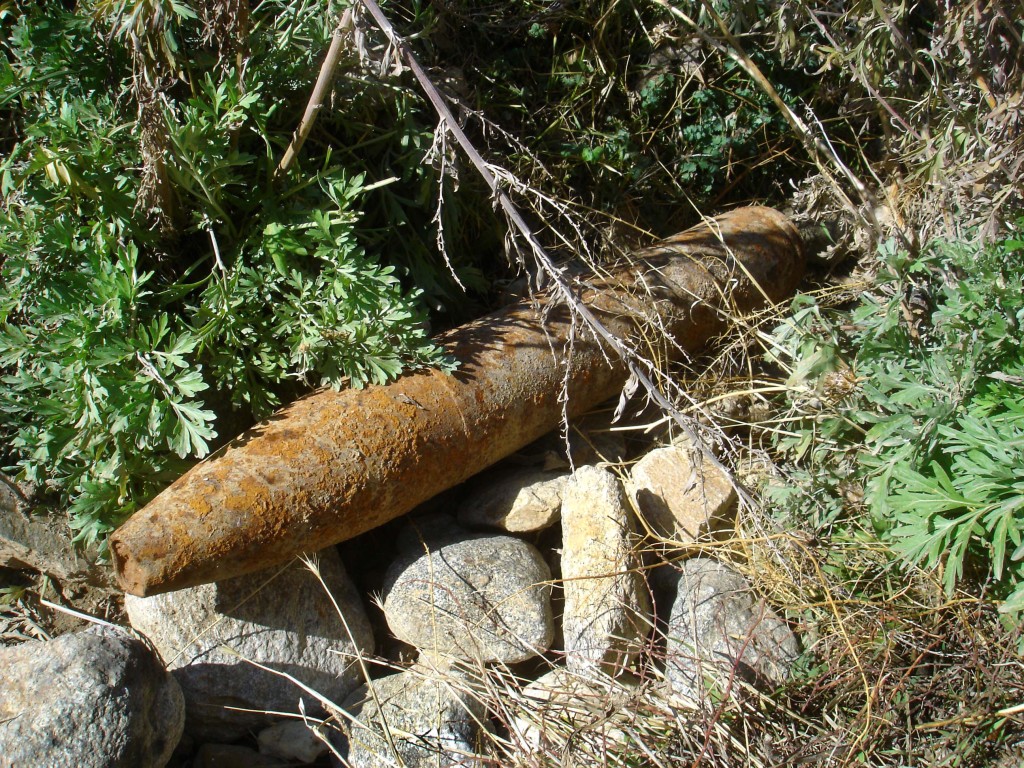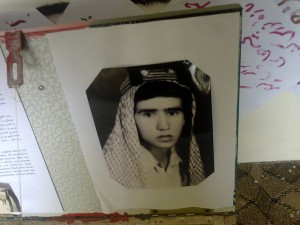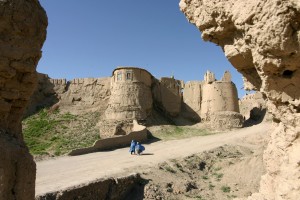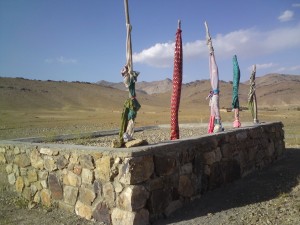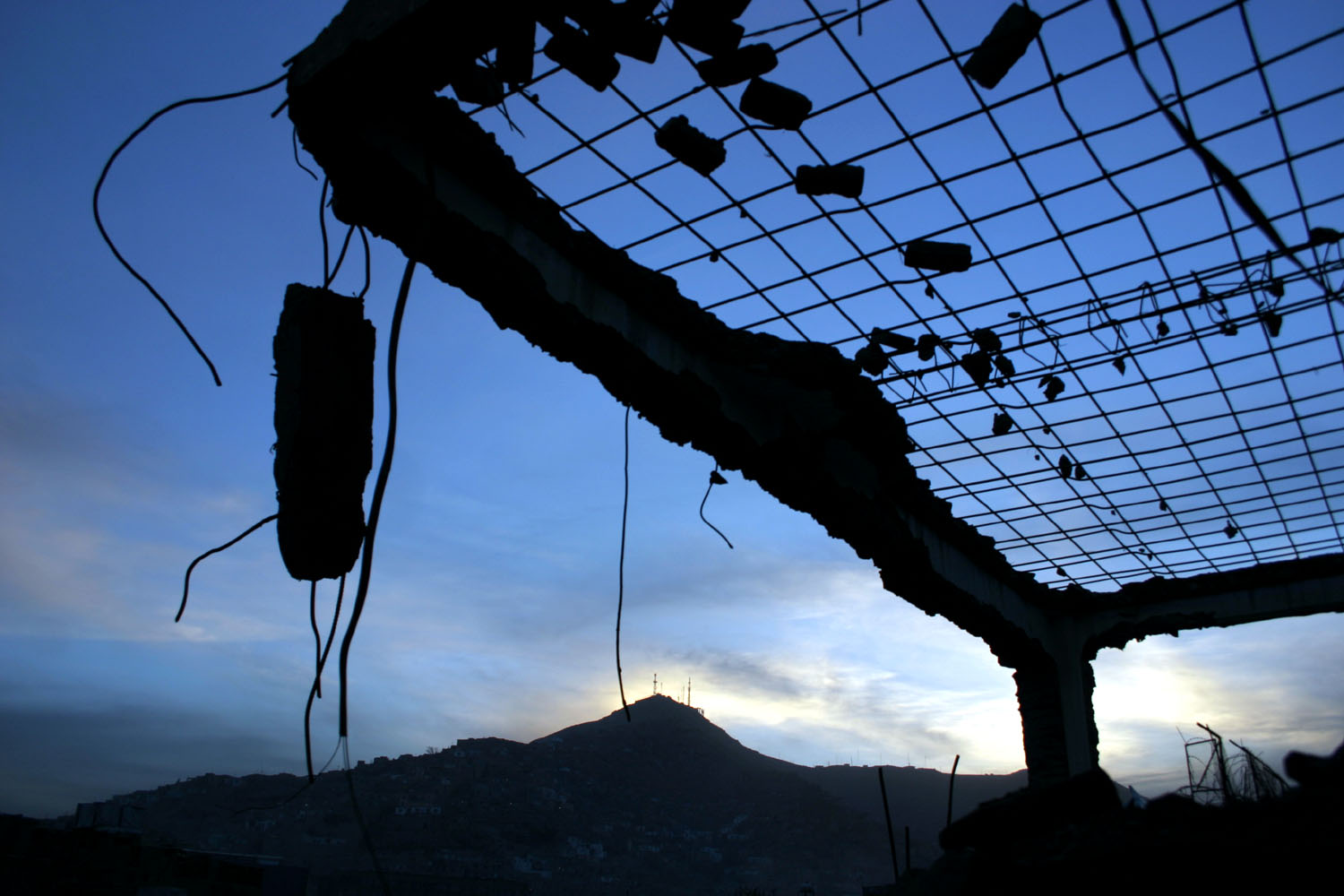Rohafza spends her days sitting behind a padlocked grill door, immovable and staring at Maidani, the place her son is buried. The woman’s face is pale, and her hair is graying. For two years the door has stayed closed, barring Rohafza from seeing her son’s grave. It’s her family that is [...]]]>
Rohafza spends her days sitting behind a padlocked grill door, immovable and staring at Maidani, the place her son is buried. The woman’s face is pale, and her hair is graying. For two years the door has stayed closed, barring Rohafza from seeing her son’s grave. It’s her family that is keeping her gated – for her own safety, as they say – to prevent Rohafza from sneaking out at night to scream at the grave site.
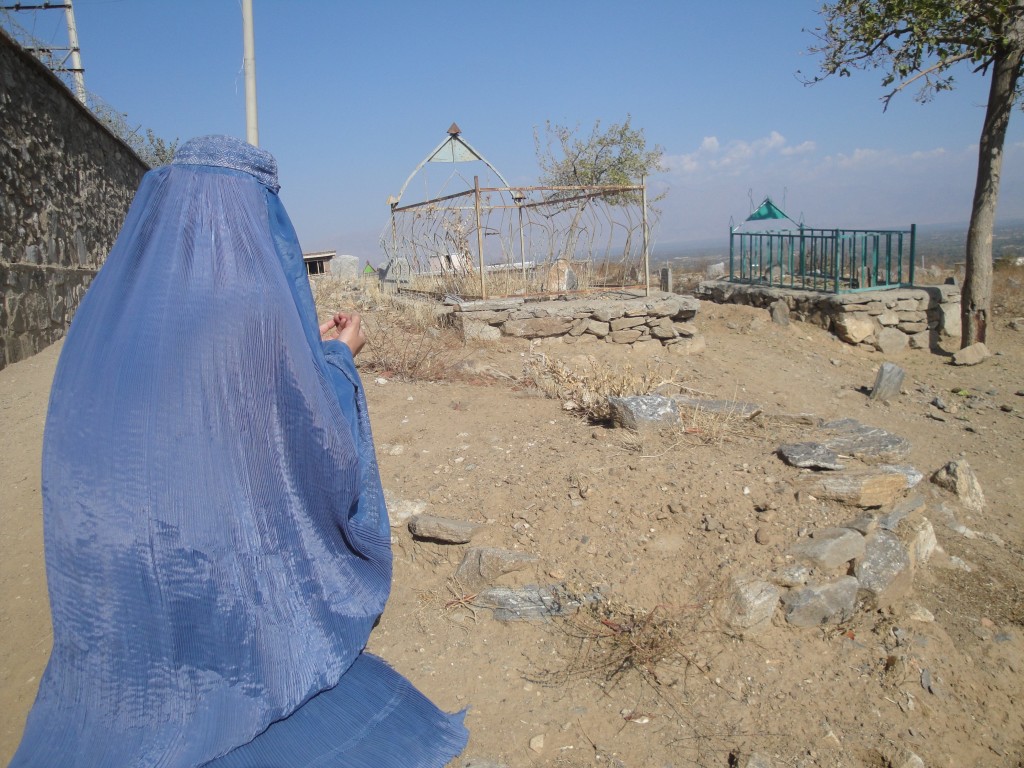
Zarmine (her back to the camera) prays in front of her brother Hashmatullah’s grave.
creidit: Sohaila Weda Khamoosh/Killid
With about 50 percent of adult Afghans suffering mental health problems, Rohafza’s story is one of millions who have undergone trauma in a war-torn country with little to no mental health services and archaic practices of handling mental illness at a family level – a combination that can make patients’ lives as tragic as the events that transformed them.
In Rohafza’s case it happened 18 years ago, when 17-year old Hashmatullah, her only son, was killed in the partisan war that followed the fall of the communist government of Afghanistan’s president Najibullah (1987-1992). Mujahedin groups that had been funded by the U.S. to fight the Soviet-backed government turned their guns on each other plunging the country into bloody civil war.
A rocket smashed into their neighbourhood killing Hashmatullah, her sister’s grandson and two of their classmates. “They were just coming back from school,” says Zarmina, one of Rohafza’s five daughters
Her father was sitting outside when suddenly there was a big blast and “Hashmat and his friends were thrown up in the air.” By the time they boy arrived at the hospital, the doctors’ efforts came too late.
“When they brought his body home, it was doomsday in our house. We sisters could hardly see the coffin for the crowds that had poured in to mourn with us,” Zarmina recalls.
According to the daughter, their son’s death unhinged both her parents, but it was her mother who lost her mind, leaving the family overwhelmed with caring for her. “Sometimes in the middle of the night we would see she was not in her bed. We would find her at Hashmatullah’s grave, screaming.”
When her mother tried to burn their house down, setting the carpets on fire, according to Zarmina, the family went ahead and tied her down with a chain. “But this only worsened her condition,” the daughter says.
As inadequate as the family’s response to Rohafza condition is, professional support is nearly non-existent in this country scarred by over three decades of war. Currently, a 60-bed clinic in Kabul is the only publicly run comprehensive mental health facility, while psychiatrists remain hard to come by. A 2006 joint report by the World Health Organization (WHO) and the Afghanistan Ministry of Public Health lists the total number of psychiatrists countrywide at two.
In 2010, the situation showed little improvement, with two doctors and a total of 200 beds for psychiatric services countrywide, according to WHO in an article by AFP.
Afghanistan, however, is not an isolated case. Seventy-five percent of an estimated 450 million people with mental health issues live in developing countries, with many of them being shut away, rather than treated.
Back in their village in Afghanistan, Zarmira remembers how her brother was born after a great deal of prayer and fasting by her mother, as their father had threatened to abandon the family if their sixth child was a girl. When Rohafza gave birth to a boy, she named him Hashmatullah, meaning Greatness. But he would not live long enough to fulfill his promise, laments his sister.
* Sohaila Weda Khamoosh writes for Killid, an independent Afghan media group in partnership with IPS. By distributing the testimonies of survivors of war through print and radio, Killid strives for greater public awareness about people’s hopes and claims for justice, reconciliation and peace across Afghanistan.
]]>Years of war have turned Afghanistan into one of the most mined countries in the world. Landmines have killed and maimed tens of thousands. In this testimony, 28-year-old Mahro recalls the day she came upon unexploded ordnance that robbed her of her sight and the use of one hand.
In 1994, the [...]]]>
Years of war have turned Afghanistan into one of the most mined countries in the world. Landmines have killed and maimed tens of thousands. In this testimony, 28-year-old Mahro recalls the day she came upon unexploded ordnance that robbed her of her sight and the use of one hand.
In 1994, the family was living in Qala-e-Haidar Khan next to Arghandi in Kabul province. They owned cows, and the sale of milk was their main livelihood. As the youngest, it was Mahro’s job to take the cows out to pasture. She remembers how, on one fateful day, she was grazing the family’s cows near a military post with her aunt’s son. “He pulled out something that was half buried in the ground, and hit it with a stone,” she remembers. When the landmine exploded, her cousin, only a bit older than she, died in the blast.
Every side in the successive rounds of fighting in Afghanistan has planted anti-personnel mines. They have been laid in residential areas and on agricultural land. Landmines were planted by the communist regime of President Najibullah, during the fighting with U.S.-supported mujahedin groups. The mujahedin, in turn, mined tracks to villages to prevent the advance of Soviet tanks. Further mine-laying took place between 1996 and 2001 during the conflict between the Taliban government and the Northern Alliance led by Ahmad Shah Massoud. Even today 45 people on average lose their limbs every month to deadly anti-personnel mines, according to Engineer Abdul Wakil, head of the Mine Action Coordination Centre of Afghanistan.
Littered with landmines
Mahro says it was a soldier who had pointed out the grassy knoll by the military post and told the children to take the cows there. “My cousin knew the area well. He had found shards of artillery there. But he did not know the grass could be hiding unexploded landmines,” she says.
Mahro says at the time of the incident a war was raging between mujahedin groups. “There were no Christians or Jews in Afghanistan. The war was among the mujahedin.” Christians and Jews is a reference to the U.S.-led international troops in the country since 2001.
Mahro’s father, who did not want his name revealed, describes it as a time when everyone was armed. He is matter of fact when he recalls the accident that changed his daughter’s future. “They (Mahro and her cousin) were foolish,” he says without a trace of emotion on his face. “They went to a military post, and hit a mine with a stone. The boy was killed and the girl lost her eyes.”
For 40 days, Mahro was in hospital. Her father says she drifted between life and death.
“She had suffered grave injuries, and we rushed her to the Jamhuriat Hospital. But when she was not getting better, we moved her to Sehat-e-Tefel (Indira Gandhi Children’s Hospital in Kabul).”
Utter frustration
At first it seemed one of her eyes could be saved, but doctors operated because they feared her brain would suffer permanent damage. After 40 days the Red Crescent flew Mahro to Germany for further treatment. She learnt how to use her lame hand, but her blindness was beyond treatment.
“I returned to the country after one year. I was in depression, though I was only a child,” Mahro remembers. “I did not have a specific problem, I was free to move around the house, but I was very sad.”
One problem that nagged her was the fact that she could not recall parts of the Holy Quran and some of Hafiz’s poems (a great Persian poet) that she had learnt by heart before the accident. “I would keep telling my family I have forgotten whatever I’ve learnt.”
Slowly she adapted to living without the gift of sight. What she had forgotten, she relearnt with the help of an aunt, uncle and two siblings. She learnt the holy book by heart – the commentary, translation and rules of reciting. “I was always interested in the Holy Quran,” she says, recalling how she stayied with a relative for eight months to study it. He was also Hafiz – one who has learnt the Holy Quran by heart, she says. “I stayed for eight after she got out of the hospital. “When I returned home, I kept learning.,” she says, until, with the help of cassette tapes, she finally mastered the full 30 chapters.
Since 2007 she has been a teacher of the holy book. Now 28, she lives in Kabul’s Gulbagh area where she teaches more than 40 students. “I don’t know how many students I’ve taught,” she says modestly. But to her students, she’s a teacher like any other.
*Kreshma Fakhri writes for Killid, an independent Afghan media group in partnership with IPS. By distributing the testimonies of survivors of war through print and radio, Killid strives for greater public awareness about people’s hopes and claims for justice, reconciliation and peace across Afghanistan.
]]>Kabul’s seventh district is also called Sarzamine Sokhta in Dari (Burned Land). Nearly everyone here has lost a family member in the successive rounds of blood-letting witnessed by the city over the last three decades. In this testimony, Mir Abdul Wadood, now a teacher in a school in neighbouring Parwan, realls [...]]]>
Kabul’s seventh district is also called Sarzamine Sokhta in Dari (Burned Land). Nearly everyone here has lost a family member in the successive rounds of blood-letting witnessed by the city over the last three decades. In this testimony, Mir Abdul Wadood, now a teacher in a school in neighbouring Parwan, realls the year 1999 when Taliban dragged away and shot nine of his family members.
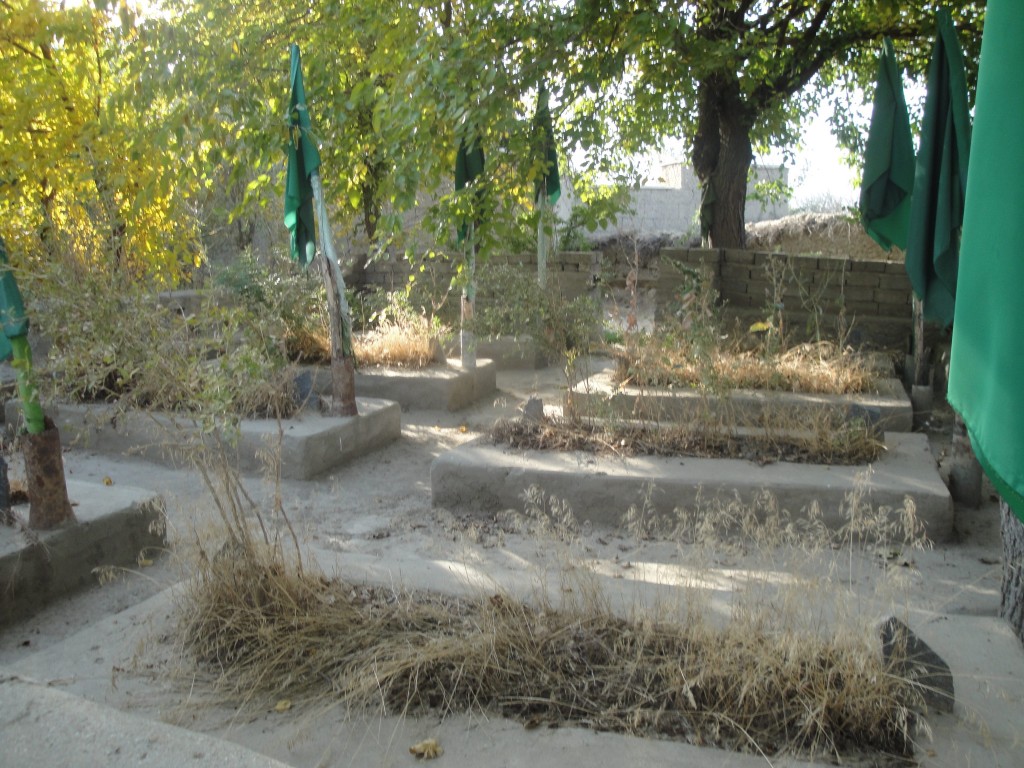
The green flags flags on the 10 graves in Parwan’s Laghmani village are visible from miles away. Credit: Killid
Among the dead that day were Wadood’s two grown-up sons, two nieces, two nephews and his wife’s two nephews. One other nephew, Abdul Hai, had a miraculous escape that allowed him to recount the story. Shot in the face, he managed to drag himself on to a road before collapsing. Passersby took him to Anaba Hospital in Panjsher, where he gained consciousness, and told them the exact location of the cold-blooded murder of nine other family members.
Wadood’s family, which hailed from Kabul and Karez Mir, north of the city, had sheltered in Parwan province to get away from the Taliban, who had formed the government in Kabul. But the Islamic fighters continued advancing north in pursuit of Ahmad Shah Massoud, an anti-soviet political and military leader who, together with his forces, had retreated to his stronghold in the Panjsher Valley.
On that fateful day in 1999, the Taliban arrived in a Datsun pickup truck Wadood’s home, and took away 10 young people, between the ages of 20 and 35 years. The captives, their hands tied behind their back, were take away and made to stand in a circle. Then, one by one they were dragged into the middle of the circle, and shot dead.
The dead, all between the ages of 25 and 35, were put to rest side-by-side in nine graves in Parwan’s Laghmani village. Today, the green flags that the family placed on the graves are visible from miles away, standing out between the yellow leaves of trees.
Killed by grief
“Unfortunately I was in Kabul at the time, and the way to Parwan was blocked,” says Wadood. “When I came back 40 days later, I went to the graves of the nine members of our family, including my two sons – one 29 and the other 25. I cried,” he says. “The graves were like swords in my eyes,” he adds.
But there was more bad news for Wadood. On his return from the graveyard he decided to visit his sister who herself had lost two sons and a daughter – to “share her grief,” he says.
“That is when relatives told me she had died. The fresh grave near the nine, which I had seen and prayed over, thinking it was a neighbour’s, was actually my sister’s. Her heart had failed from grief.”
Wadood gets up and shuts the door leading to an inside room where his wife is. He says she has been very disturbed ever since he told her that a journalist was coming to interview them about the death of their sons.
“My wife has never been the same since the deaths,” he says. “When the nine coffins were brought into the house everyone cried and screamed, but not my wife. Her voice was not heard. Her depression worsened when our elder son’s widow married again, leaving us to take care of their two children.”
Scarred forever
Wadood confides that their sons are never mentioned because it upsets his wife. “Laughter has left our house,” he says. “We never mention our sons. I have had to bury their remembrance along with them, I have no choice,” he adds.
Today, a third of his salary as a schoolteacher, which is roughly 6,000 Afs, or 110 U.S. dollars, is spent on medication for his wife.
His story is not unusual, Wadood says. Between 1996 and 2001, the Taliban and Massoud’s Northern Alliance fought for control of Parwan. Every time the Taliban won the province, the Shariah law was implemented. Parts of the province went back and forth from Taliban hands to Massoud’s. Hundreds of civilians died. The fighting ended with Massoud’s assassination by two suicide attackers believed to be al Qaida, on Sep 9, 2001 – two days before the bombing of the World Trade Centre in New York.
Three months later, in December 2001, U.S. forces invaded Afghanistan and ousted the Taliban starting a new chapter in the tumultuous history of Afghanistan and its civilian polulation.
* Sohaila Weda Khamoosh writes for Killid, an independent Afghan media group in partnership with IPS. By distributing the testimonies of survivors of war through print and radio, Killid strives for greater public awareness about people’s hopes and claims for justice, reconciliation and peace across Afghanistan.
]]>Esmatullah Mayar writes for Killid, an independent Afghan media group in partnership with IPS. By distributing the testimonies of survivors of war through print and radio, Killid strives for greater public awareness about people’s hopes and claims for justice, reconciliation and peace across Afghanistan. In this testimony, 55-years-old Mahparwar remembers Shab-e-Barat, “the Night of Forgiveness”, is an [...]]]>
Esmatullah Mayar writes for Killid, an independent Afghan media group in partnership with IPS. By distributing the testimonies of survivors of war through print and radio, Killid strives for greater public awareness about people’s hopes and claims for justice, reconciliation and peace across Afghanistan. In this testimony, 55-years-old Mahparwar remembers Shab-e-Barat, “the Night of Forgiveness”, is an Islamic holiday celebrating God’s mercy. People pray for forgiveness for those who died. It was on one such night of forgiveness, 21 years ago, that Mahparwar’s younger brother was killed by the mujahedin.
Mahparwar’s brother Mohammad Shafi was a cycle repairer in Kabul. The 19-year-old had just married a year earlier “And had a pair of twins — a daughter and son,” his sister recalls. He had no connection with any political party, she stressed, saying he was neither a member of Khalq nor Parcham — two communist parties that ruled Afghanistan after the assassination of president Daud Khan in April 1978. “He did not have a job with the government or any organisation.”
It was last days of the regime of President Najibullah, (1987 -1992) and the war between government forces and jihadist parties had engulfed the country, remembers Mahparwar. It was the 15th of Shoban, 1370 (July 5, 1991 in the Gregorian calendar), as they celebrated Shab-e-Barat, when tragedy struck.
“My brother was travelling to Jalalabad when armed people (mujahedin) came down from the mountains in Mashal Kandaw (on the highway between Kabul and Jalalabad), abducted and killed him immediately.”
His killers left his body on the roadside and fled, says Mahparwar.
“We got to know about his murder on Barat night but we could not find his body. My other brothers searched all over. Some of our relatives said they had seen our brother in their dreams, and we should search for him in the places they mentioned.
Her brothers searched everywhere. In the end they found him in a hospital mortuary.
Death of innocents
Mahparwar had been kept unaware, she says. “All they told me was that Shafi was injured, and was found in the Kabul hospital. But when I went to my father’s house I saw a friend of my brother, a soldier in the army, weeping loudly.”
“We buried him in Charqala village of Chardehe (Kabul province). My mother has not been well ever since.”
Shafi was the cleverest and most hardworking of her siblings says Mahparwar, working in his bicycle repair shop steadily through the winter and long hot summer. He did not waste his time in idle gossip, she says.
her sister-in-law, Shafi’s wife, finally remarried and took their son with her. “His name is Sahel, he looks very much like my brother,” she adds.
The situation in Kabul, meanwhile, went from bad to worse when Najibullah’s government was toppled by mujahedin forces, who then turned on one another. People fled the city in the tens of thousands. Mahparwar, too, became a refugee in Peshawar.
Bad news continued to pour across the border. “There was not one day when we did not hear of the death of relatives in Afghanistan. My younger sister’s husband was killed in the war between Hezb Islami and the Hezb-e-Islami led by General Dostum in Mazar-e-Sharif.”
Lost futures
In her childhood she had built castles in the air for her family, says Mahparwar, but the warlords “dashed everyone’s dreams and hopes”. All three of her brothers are poor, she says, one is a taxi driver, the other a labourer. A third is a mechanic. “The war took everything from us.”
Mahparwar’s children go to school, and she says she is happy for them. But she continued to be haunted by the fact that her brother’s killers are still free. “Arrest the murderers of my brother. Arrest the murderers of many others as well. They should be tried,” She says.
“They made us weep. They took away our breadwinners from us.” While her brother died on the night of forgiveness, for Mahparwar forgiveness is not within her reach, she says.
Instead, she wants for the stories of three decades of war to be told and remembered. She wasnts the to be collected and archived, so that “Future generations can see how our country was tyrannised,” she says.
Today, Mahparwar is a member of the Women’s Council in Chehelsotoon, in Kabul city, which was set up to support survivors of war.
]]>
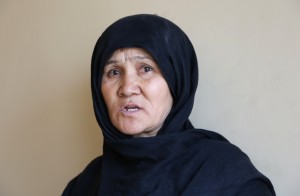
Rahima lived in Iran as a refugee for seven years. She returned to Kabul in 2007. Photo: Najibullah Musafer/Killid
At the start of the war between the Taliban and mujahedin in 1996, Rahima lived with her family in Kabul’s Qala Jernail.
Emerging out of madrasas along Pakistan’s border with Afghanistan, the Taliban that year marched into Kabul and ousted mujahedin Ahmad Shah Massoud.
At the time, the mujahedin were in power under an agreement brokered between the different factions by the West after the collapse of the communist government of president Najibullah. But the agreement collapsed within months, leaving Kabul — which had survived the earlier years of war between the communists and the mujahedin – to be torn apart by rival guerrilla factions fighting for control over the city. In fact, the bloodshed was so terrible that Kabul residents welcomed the more disciplined Taliban fighters when they seized power and drove out the mujahedin.
But as history has shown that relief was short-lived.
Rahima says her family had lived peacefully in Kabul until the war broke ou.Her husband was a daily wage worker and they had a good enough life.
As the Taleban fought their way into Kabul, there was an exodus of civilians from the city, but Rahima’s family could not leave, because her husband had been jailed. “[The Taliban] jailed my labourer husband, and took him away to Paghman,” she says. He was finally released because they could not find any reason to keep him.
Turning breadwinner
The couple and their four children fled to safety to a village outside Mazar-e-Sharif called Babayadgar, where they lived for two years until the war caught up with them. The noise of rockets and rifles one night announced the arrival Taliban, eliminating anyone who crossed their path.
“They took my husband to a garden,” Rahima recalls of the day her husband was picked up. “We had no news of him for two days. Then we heard that a body was found in the garden — I went and identified it as his.”
Her husband gad been brutally tortured, his chin smashed with the butt of a rifle, his arms and legs broken.
Rahima brought her husband’s body home, washed and buried him with the help of neighbours. When she arrived back home, intruders forced their way into the house, burning everything.
The scared family fled into the desert until a modicum of calm had returned to the village. When they came back to their ruined home, Rahima had no money to buy even a bag of flour.
“The sky was far and the ground hard,” she says, reciting an Afghan proverb about the difficulty of the situation they faced.
A shopkeeper took pity on the family, and gave them loaves of bread to eat every night. But Rahima did not want to live only on charity. She made use of the relative security in Babayadgar to find work spinning cotton, sewing quilts and washing clothes – jobs that brought her small amounts of money.
The family succeeded in keeping hunger at bay, but the bitter cold of winter had to be endured. “We were putting on gloves and hats inside the house. Sometime we would put the lantern under the quilt to reduce the cold. We had no heater or stove to keep ourselves warm, and except God no one was there to help us in the city.”
Lucky break
In 2000 they made the journey back to Kabul. But faced with no prospect of work – women were not allowed to work under the Taliban – Rahima took the help of an “agent” to cross over into Iran with her children. She lived in Iran for seven years as a refugee, doing all kinds of work from washing carpets to factory jobs, to put her two daughters through school while her sons worked.
In 2007 she returned to Kabul having heard that the Karzai government was giving financial assistance to widows. She says she did not know that “such a fruit needs long hands to get”, meaning it was out of the reach of the poor. “We heard (in Iran) that Karzai was donating land to widows so we returned. When we came here we got no help from Karzai or the government.”
But luck was on her side in the form of new employment. Today, Rahima works in the office of the Killid Group where she is knows as “Aunt Fatima” and counted among its most hardworking and loyal staff.
*** Ali Arash writes for Killid, an independent Afghan media group in partnership with IPS. By distributing the testimonies of survivors of war through print and radio, Killid strives for greater public awareness about people’s hopes and claims for justice, reconciliation and peace across Afghanistan.
]]>Kreshma Fakhri writes for Killid, an independent Afghan media group in partnership with IPS. By distributing the testimonies of survivors of war through print and radio, Killid strives for greater public awareness about people’s hopes and claims for justice, reconciliation and peace across Afghanistan. In this testimony, Zubaida from the village of Qala Mullah recounts for [...]]]>
Kreshma Fakhri writes for Killid, an independent Afghan media group in partnership with IPS. By distributing the testimonies of survivors of war through print and radio, Killid strives for greater public awareness about people’s hopes and claims for justice, reconciliation and peace across Afghanistan. In this testimony, Zubaida from the village of Qala Mullah recounts for the firs time how she, thirty-two years ago, watched her husband being taken away by Soviet soldiers.
“It was the 2nd Sawr in 1359 (April 21, 1980),” Zubaida begins her account of the events that happened 32 years ago. “My husband was visiting us in Jaghatoo district, in Ghazni. A year before the communist government of Babrak Karmal had won power with the help of the Russians (then Soviet Union).” Many Afghans were angry, she said, and “drawn into a fight between Jihad and atheism” as she says – the one led by U.S.-supported mujaheddin, the other by the ruling government.
A man named Sayed Jagran was the commander of the anti-government forces in Jaghtoo district, where they lived. “In my village, Qala Mullah, he was carrying out propaganda against the government. But few people had the time for him. Most people were working on Bande Sardeh (a dam 28 kilometres away in south Ghazni).” Zubaida’s husband Mohammad Ismail was one of those who would come home on Thursday after a week of hard work, and return early in the morning on Saturday.
“One Thursday he came back and never went back to Bande Sardeh,” she says. Russian soldiers swarmed Qala Mullah after the Ashrars (anti-government forces) had already left the area. Only defenceless people remained. “ ‘Come out of your houses,’ the Russians shouted. We trooped into a compound — my husband was the first person they led away.
Zubaida and her six children tried to stop them, but he was taken away to nearby Qala Qata. “They took him to the centre of the village and shot him for siding with the opposition,” she remembers “They had no pity on anyone. They went from house-to-house killing all the men.”
In the end, they killed 21 of her relatives. Except for one farmer who escaped there was no male left to bury the dead, she says. “We ferried the bodies in a wheelbarrow, and buried them in a pit.”
“I tied a piece of red cloth on a pole on the top of our house so the Russians would not bomb us.”
]]>
Noor Wali Shinwarai writes for Killid, an independent Afghan media group in partnership with IPS. By distributing the testimonies of survivors of war through print and radio, Killid strives for greater public awareness about people’s hopes and claims for justice, reconciliation and peace across Afghanistan. In this testimony, Khaled Noor remembers his father, a [...]]]>
Noor Wali Shinwarai writes for Killid, an independent Afghan media group in partnership with IPS. By distributing the testimonies of survivors of war through print and radio, Killid strives for greater public awareness about people’s hopes and claims for justice, reconciliation and peace across Afghanistan. In this testimony, Khaled Noor remembers his father, a colonel in the Afghan army, who was imprisoned and killed for trying to restore republican rule.
In 1978, Eid al-Adha, one of the two main Muslim holidays, fell on a winter day, Khaled Noor remembers – perhaps less because of the festivities than the events that unfolded the night before.
As families prepared for the holiday, some 200 Afghan army officers gathered in great secrecy in the Asmar Division in Kunar province to discuss ways to restore the republic of Mohammed Daud Khan, Afghanistan’s first president, who had been overthrown in a coup d’etat by Noor Mohammad Taraki only six months before.
The division had an emergency airport, four residential blocks for army officers, many tanks, military vehicles and thousands of soldiers. But their attempt to restore republican rule, would be short-lived.
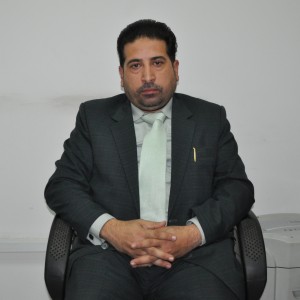
Lawyer Khaled Noor sometimes wishes “Our father would walk through the door and give us a hug”. Credit: Killid
Rise and fall
The leadership of the division was in the hands of the highly decorated Colonel Ghulam Dastageer Khan, son of the leader of the Shinwari tribe – and Khaled Noor’s father.
Years before, in 1964, he had been given the onerous task of marking out the international border with China in the Pamir mountains – a two-year endeavor that earned him awards from both countries, followed by an appointment as assistant of Sardar Wali Khan, the son-in-law of the Afghan king.
In 1973, Daud Khan overthrew the last king of Afghanistan, Zahir Shah, and founded the republic of Afghanistan.
By the time the communist party seized power through a coup in 1978, Khaled Noor’s father had become a colonel under Daud Khan.
By cutting off communications between the presidential palace and Kandahar, the communists initially managed to keep the colonel and other friends of the president in the dark about the fall of the leader.
When 200 of them finally came together back at the Asmar Division, their attempt to restore the president was in vain — Taraki soon had them arrested, imprisoned and tortured horribly.
Daud Khan’s assassination the same year was to plunge the country into decades of bloodshed and turmoil.
Colonel Khan’s children – Khaled Noor, Sardar Khan, Bilal, Spinghar and Mirwais – were still young when their father was arrested that wintery night before Eid al-Adha.
There was great excitement in the house over the coming feast. Suddenly there was a great banging on the front door. A military commander loyal to their father had come with bad news. “He told me, ‘Your father and all his friends have been arrested,’” Noor remembers.
“Though we were small, we knew that arrest meant death — the arrested never returned to their family. Our family and all the other families did not wear new clothes that Eid.”
The family was forced to vacate their house. Their things were put in a truck, and taken to Jalalabad. Khaled Noor says since they had no relatives in the city they went to their village in Haska Mena, Nangarhar. Their relatives saved the family from starving by sharing wheat flour and other food that they grew.
In Kabul, Hafizullah Amin, the second leftist president, overthrew Taraki. A military man came to their house with a letter for their mother.
Badly tortured
Writing from prison, Khan said that all his friends were killed in front of his eyes. “He said he was opposed to the communists, and he would never obey them,” Noor says. “He told my elder brother to look after the family.”
The man who brought the letter said their father was in Jalalabad jail and the family went to visit the prison laden with gifts for their father. But he had been tortured a lot and he was very weak, his son remembers.
In 1980, the year Babrak Karmal became the third communist president of Afghanistan, Colonel Khan died in prison.
The family was in mourning when the Soviets bombarded their village in Haska Mena district.
They fled across the border to Hango in Pakistan, where the two eldest brothers worked and the other siblings, including Khaled Noor, went to school.
Now, Mirwais, the youngest, is the head of a school in Kabul. Khaled Noor, meanwhile, is a lawyer working in a communications company in Kabul. “Life is good for us, “ he says. “But we still wish our father would walk through the door, and give us a hug.”
]]>Ebrahim Mahdawi writes for Killid, an independent Afghan media group in partnership with IPS. By distributing the testimonies of survivors of war through print and radio, Killid strives for greater public awareness about people’s hopes and claims for justice, reconciliation and peace across Afghanistan.
In this testimony, Seventy-year-old Abdul Husain from Deh Afghan remembers a [...]]]>
Ebrahim Mahdawi writes for Killid, an independent Afghan media group in partnership with IPS. By distributing the testimonies of survivors of war through print and radio, Killid strives for greater public awareness about people’s hopes and claims for justice, reconciliation and peace across Afghanistan.
In this testimony, Seventy-year-old Abdul Husain from Deh Afghan remembers a Russian attack on his village in the Nahoor district. Today, Nahoor, in Ghazni province, is picture postcard pretty: green with plentiful water from streams and rain. There are orchards of apricots, plums, prunes and other fruit. But three decades ago it was the site of a bloodbath.
The worst year was 1981, two years after the Soviet army rolled across the border into Afghanistan. Russian soldiers tried to fight their way into Nahoor through the Qeyagh pass. They bombed Deh Afghan and Sokhta Alawdani, the two villages closest to the border.
“The murdered people were all my relatives – one of my brothers, four cousins and so many others,” says Husain.
There are families who don’t know what happened to loved ones, while in village after village, the many physically challenged survivors are daily reminders of the bombings and killings.
Nahoor with its majority Hazara population was on the frontline of the war between Soviet soldiers and mujaheddin. Power in Kabul rested in the hands of Babrak Karmal, the third communist party president. Nahoor was the first district the Afghan fighters had wrested from the “Russians” as the Soviets were called. The Soviet army bombarded Nahoor from the air and with heavy artillery.
Terror everywhere
According to Husain, who is also known as Malak Abdul, even people in remote and mountainous areas of Nahoor were not safe from Russian “barbarity”. The terror was everywhere. There was no peace for civilians. Those who objected were tortured, and thrown in prison.
Russians entered people’s houses, and stripped it of all belongings. Buildings were demolished. Families fled the fighting and killing. The only people who remained were the mujaheddin.
“I also took my family to a safe area hoping to come back when it was safe,” says Husain.
While his younger brother and his family left, his elder brother and relatives stayed to defend the village. “My brother knew the Russians were coming but he was not aware they had already entered the village. He tried to save himself by moving to Ghara, a village adjacent to ours. But he did not make it,” he says.
Husain and his brother, their families and others from the village, kept walking. But there was no escaping the whine of fighter planes and pounding of shells. “It was terrifying. We did not know how to get away. We decided to go to the Siah Qul area where we thought it would be safer and out of the enemy’s line of firing,” he says.
Gunned down
One kilometre short of Siah Qul, a barren valley in the desert, the Soviet soldiers caught up with the fleeing civilians. “There was one kilometre to get to Siah Qul. Suddenly the desert erupted with the sound of tanks. The Russians had besieged the desert.
“We didn’t know the mountains above Siah Qul were the hideout of mujaheddin,” says Husain.
Russian tanks trained their guns on the winding procession of fleeing civilians. In the bloodbath that followed, only those who ran up the mountainsides survived.
“We were still in the middle of the desert when the Russian tanks started firing toward us from three sides. We ran as fast as we could toward Sia Qul valley. The only hope of escape lay in going into the mountains where the mujaheddin were hiding,” he recalls.
“My brother Jan Ali and some others were running helter skelter to save themselves. The group had scattered. But no one was able to save themselves. Russian tanks got them all in the end,” he says.
Sole survivor
The first one to go down was a relative called Sultan. A shot first got him in the leg. He was screaming, but the Russians had no pity, says Husain. “They sprayed him with bullets,”. Bodies littered the ground.
Husain still cannot fathom how he was the only person who escaped. “The invaders killed all of them. They fired hundreds of shots,” he says.
The Soviet soldiers eventually retreated after 24 hours in nearby Sokhta Alawdani, and men started trickling back into the village. “Women and children stayed away because there was still the possibility of the Russians returning,” he says. “We gathered together all the bodies of the dead.” They decided to bury the martyrs in one place, on a hill called Tapa e Karez. “It wasn’t a graveyard. The hill is called the hill of martyrs,” he says.
The Russians never came back to Nahoor and the village remained in mujaheddin hands until the Soviet army pulled out of Afghanistan in 1989.
]]>
Suhaila Weda Khamoosh and Ali Arash write for Killid, an independent Afghan media group in partnership with IPS. By distributing the testimonies of survivors of war crimes through print and radio, Killid strives for greater public awareness about people’s hopes and claims for justice, reconciliation and peace across Afghanistan. In [...]]]>
Suhaila Weda Khamoosh and Ali Arash write for Killid, an independent Afghan media group in partnership with IPS. By distributing the testimonies of survivors of war crimes through print and radio, Killid strives for greater public awareness about people’s hopes and claims for justice, reconciliation and peace across Afghanistan. In this experiences, Nooria Wesal of the Afghanistan Independent Human Rights Commission’s Wesal recounts experience that turned her into an activist.
It was 1983 and Nooria Wesal was designing a letter at home in Jamal Mena, Kabul, when her house was besieged.
“Intelligence agents arrested me and confiscated all the anti-Communist material,” she recalls. “They took me to the interrogation centre in Shah Darak.”
Nooria was still a schoolgirl at the Rabiya Balki High School when she was arrested. A member of the Hezb-e Wahdat-affiliated youth party, Nasr, she was in charge of printing bulletins and distributing material to students at universities and union members.
For the next three months in Shah Darak prison she saw neither sunrise nor sunset. Like her fellow prisoners, she was beaten, starved and tortured. “I faced sleep-deprivation, electric shocks, beating and kicking,” she recalls.
Sentenced to two years in prison for anti-Communist party activities she was transferred to the dreaded Pol-e-Charkhi prison. She describes the prison as the “most frightening in the world”.
She was imprisoned in a cell, where she could neither stand nor lie down, she said. “The goal of the jailers was to face political prisoners with gradual death,” she said.
For the first six months she was not allowed to even comb her hair, cut her nails or receive visitors. Later, she was moved to a room with nomadic Kuchi prisoners who were accused of transporting weapons for the mujaheddin. “I had not talked to anyone for six months. My jaws hurt trying to talk. I thought I had lost the ability to speak,” she says.
There were old women, pregnant women and even newly married women prisoners in the jail. “All of them were not against the government or linked with the mujaheddin — there were many innocent women,” says Nooria. “There was a teacher from the Ayesha Durani High School. Her crime was that she told her students that we were gradually losing our country.”
In 1985, Nooria was released in a prisoner swap by Ahmad Shah Massoud, a central figure in the resistance against Soviet occupation.
Anything but ordinary
Noor Wali Saeed Shinwarai writes for Killid, an independent Afghan media group in partnership with IPS. By distributing the testimonies of survivors of war crimes through print and radio, Killid strives for greater public awareness about people’s hopes and claims for justice, reconciliation and peace across Afghanistan.
This [...]]]>
Noor Wali Saeed Shinwarai writes for Killid, an independent Afghan media group in partnership with IPS. By distributing the testimonies of survivors of war crimes through print and radio, Killid strives for greater public awareness about people’s hopes and claims for justice, reconciliation and peace across Afghanistan.
This testimony follows Mohammad Hasan, who says he had a good life before the breakout of war in the 1990s. But the fighting between mujaheddin factions between 1992 and 1996 rendered him a pauper. Two decades later, he has not recovered.
Before the war, Hasan, 67, was a motor mechanic in a village near Ghazni. “I was a popular mechanic, and I had a good life. I had 80 barrels of oil in my shop. I had a truck,” he says with great pride.
But then the war arrived — one day gunmen came to his shop, beat him up and drove off in his truck piled high with everything he owned.
“They left me with just the clothes I was wearing. They took away whatever I had including money, and the old truck,” he says, shaking his head sadly.
Hasan borrowed some money from people, and left with his family for Kabul Dehbori. “I was an indigent in Kabul,” he recalls. “I was remorseful about leaving the village. People took pity on us, and donated some pots in charity.”
Hasan calls the nineties a time of trouble for even the rich in their palaces. Life was like sipping from a poisoned chalice, he says. The poor saw death as a relief, he adds.
The tenth grave
In Kabul, Hasan and his family first sheltered in a mosque, before finding a house in Dasht Barchi. But the ouse was close to a mujaheddin gun post targeted by rival fighters. Hasan recalls a rocket caming down on a nearby house and killing seven people, “One of them had married only 10 days back.”
When a barrage of rockets hit the gun post, killing nine, Hasan decidee to dig graves for the men.
Just as he was finishing, news arrived of his own family being in peril. “A rocket had come down on our house. When I got there, my 22-year-old son was dead,” he says gruffly, trying to hide his grief.
The tenth grave he dug that day was for his son.
Everywhere that night, in the cover of darkness, people dug graves and washed bodies, preparing the dead for burial. Five people had died in Hasan’s neighbour’s house.
He found a mullah who agreed to a mass funeral. All the bodies were brought to the graveyard. But just then there was another round of rockets, and people fled including the cleric.
“I remained alone among the bodies,” says Hasan. “At midnight I knocked on some doors and found three other people and together we buried the bodies.”
But sadness was not through with Hasan that night. When he got home his wife told him their daughter Nilofar had been badly injured and taken to the hospital by neighbours.
Outside his window, war was not about to stop. When an explosion hit nearby, Hasan climed the roof to find his neighbour’s house in flames. Fortunately no one was killed, he says.
It wasn’t long before a piece of rocket pierced Hasan’s arm, leaving blood pouring out of his arm. As people screamed to get him to climb down, Hasan fainted and fell from the roof to the street below.
While Hasan recovered except for the use of his right hand, his daughter returned from the hospital unnable to ever walk again.
“She is alive but does not leave the house. She cries all the time,” he says.
Hasan has not been able to reconcile with his present. “I am tired of life,” he says. “I was not poor like I am now.” He has found work as a poorly-paid watchman, staying awake all night to earn bread for his family. “I am a victim of war — it is the war that has made me poor.”
Hasan wants to see the gunmen of the Kabul war punished in this life — but he is certain punishment awaits them in the court of God.
]]>